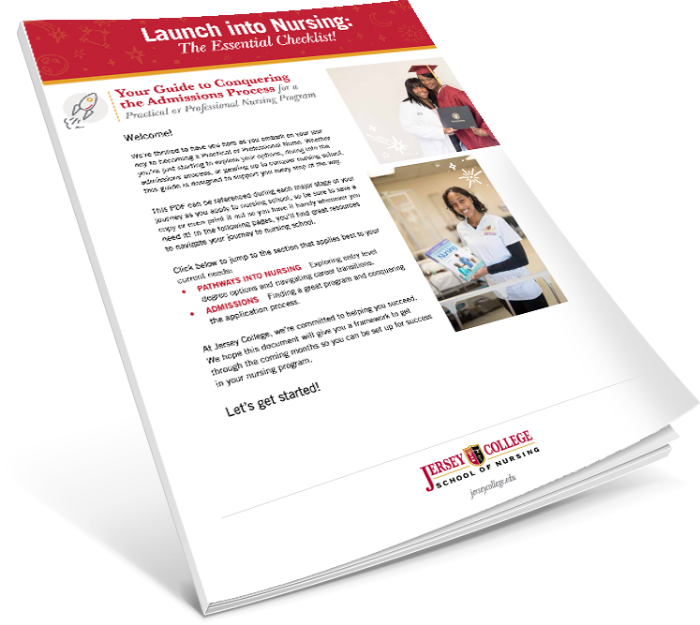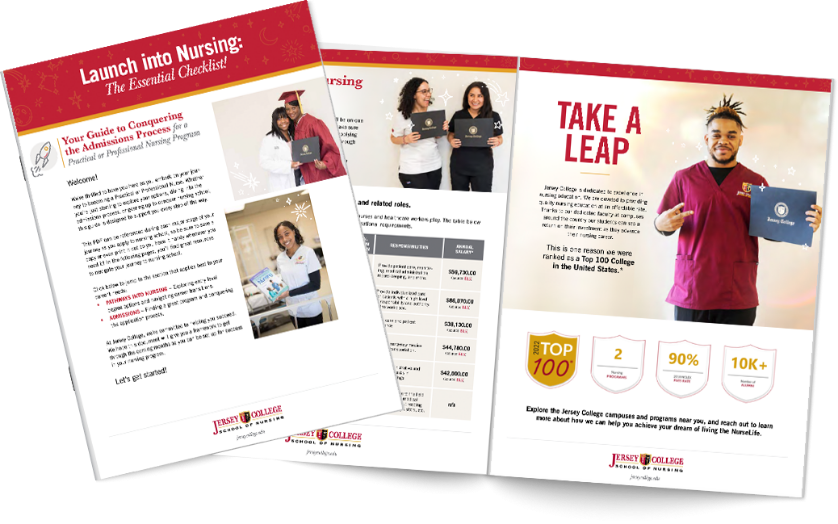
How to Choose the Right Nursing School
Decide What Your Nursing Goals Are

Consider questions like:
-
What area of nursing interests you most?
-
Do you want to work in a hospital, clinic, or community setting?
-
Are you interested in specializing in a particular field of nursing?
Setting clear, realistic educational objectives is the first step in selecting the right nursing school. Your goals will guide you through the rest of the decision-making process.

FREE Essential Guide to Nursing School: Get Accepted, Survive, and Thrive!
Explore the Types of Programs Available
Nursing education offers various pathways to suit different career goals and circumstances. Here's an overview of common program types:
- Licensed Practical Nurse (LPN) Programs: These typically take 12-18 months to complete and prepare you for entry-level nursing positions.
- Associate Degree in Nursing (ADN) Programs: Usually completed in 2-3 years, these programs prepare you to become a registered nurse (RN).
- Bachelor of Science in Nursing (BSN) Programs: These programs typically take four years to complete and offer a more comprehensive education that can lead to broader career opportunities.
- LPN to RN Bridge Programs: Also sometimes called Advanced Placement programs, these are designed for LPNs who want to become RNs. These programs build on your existing knowledge and skills.
Each program type offers different educational scopes, durations, and potential career paths. Consider which aligns best with your career goals and personal circumstances.
Related Resources:
Choose Between Online and In-Person Instruction
The mode of instruction is another crucial factor to consider. Both online and in-person programs have their advantages:
Online Programs
- Offer greater flexibility for working professionals or those with family commitments
- Allow you to study at your own pace
- Can be more cost-effective due to reduced commuting and housing expenses
In-Person Programs
- Provide hands-on experience in laboratory settings
- Offer face-to-face interaction with instructors and peers
- May be preferred by employers
Some programs offer hybrid models, combining online coursework with in-person clinical experiences. Consider your learning style, lifestyle, and preferences when choosing between these options.


Sign up to get new articles in your inbox and stay updated on our nursing programs.
Consider Where the Campus Is Located
The location of your nursing school can significantly impact your educational experience and future career opportunities.
Consider:
- Urban vs. rural settings: Urban areas may offer more diverse clinical experiences, while rural settings might provide unique community health opportunities.
- Proximity to healthcare facilities: Being close to hospitals and clinics can provide more options for clinical rotations and potential employment after graduation.
Remember, the location you choose may influence where you start your nursing career, as many nurses find their first job near their school.
Explore Our Campuses
Jersey College has many campuses located across the United States providing convenient, high-quality nursing education.
What Should I Be Looking for In a Nursing Program?
Now that you've considered your goals, program types, and preferred learning environment, it's time to focus on the specific qualities that make a nursing program stand out. Here are some of the key factors to evaluate when assessing any nursing program:
-
Check to See If the Institution Is Accredited
Accreditation is an important factor to consider when choosing a nursing program. Accredited schools voluntarily submit themselves and their programs for quality checks, which can be a good indicator that you've found a quality institution.
While accreditation is certainly valuable, it's important to note that many successful nurses have graduated from non-accredited programs and gone on to have rewarding careers. If you're considering a non-accredited program, just be sure to speak with an Admissions Representative about how this might impact your specific career goals and opportunities in your area.
-
Look into the NCLEX Pass Rates
The National Council Licensure Examination (NCLEX) is a standardized test that all nurses must pass to become licensed. A program's NCLEX pass rate can be a strong indicator of how well it prepares students for professional practice.
When evaluating nursing schools, ask about their first-time NCLEX pass rates for recent graduating classes. Higher pass rates often suggest that the program effectively prepares students for the exam and, by extension, for nursing practice.
-
Consider the Cost of the Program and Check Out Financial Aid
The cost of nursing education can vary significantly between programs. When evaluating costs, consider:
- Tuition and fees
- Books and supplies
- Living expenses
- Potential lost wages if you'll be reducing work hours
Don't let the sticker price deter you immediately. Many programs offer financial aid options, including:
- Scholarships
- Grants
- Federal and private loans
- Work-study programs
Research and compare the total costs and available financial aid for each program you're considering.
-
Find a Program That Offers a Learning Environment That Works for You
The learning environment can greatly impact your educational experience and success.
Consider factors such as:
- Class sizes: Smaller classes often mean more individual attention from instructors.
- Student support services: Look for programs that offer academic advising, tutoring, and career services.
- Campus culture: If possible, make a trip to visit the campus or attend a virtual information session, where available, to get a feel for the program's atmosphere.
- Technology and resources: Ensure the program has up-to-date facilities and resources for nursing education.
Choose a program where you feel you'll be supported and can thrive academically.
Related Resources:
-
Consider the Clinical Opportunities Available
Clinical experiences are crucial in nursing education. They provide hands-on practice in real healthcare settings, allowing you to apply classroom knowledge and develop essential skills.
When evaluating programs, ask about:
- The variety of clinical settings offered (hospitals, clinics, community health centers, etc.)
- The number of clinical hours included in the program
- Any partnerships with local healthcare facilities
- Opportunities for specialization or focus in areas of interest
Programs with diverse and extensive clinical opportunities can give you a significant advantage in your nursing career.
-
Consider How Long Each Program Will Take to Complete
Program duration is an important factor, especially if you're eager to enter the workforce or have other commitments. Consider:
- Full-time vs. part-time options
- Accelerated programs (if available)
- Your personal and professional commitments
- Your financial situation and how long you can sustain being a student
Remember, the shortest program isn't always the best choice. Balance the program length with the quality of education and how well it aligns with your career goals.
Related Resources:
-
Check Out the Admissions Requirements and Make Sure You Meet Them
Understanding and meeting admissions requirements is crucial for a successful application. Common requirements for nursing programs include:
- High school diploma or equivalent
- Minimum GPA (often 2.5 or higher)
- Prerequisite courses (such as biology, chemistry, and anatomy)
- Standardized test scores (SAT, ACT, or program-specific entrance exams)
- Letters of recommendation
- Personal statement or essay
Some programs may also require:
- Prior healthcare experience
- CPR certification
- Background check and drug screening
To increase your chances of acceptance:
- Start preparing early, especially for prerequisite courses
- Maintain a strong GPA in all your coursework
- Gain relevant experience through volunteer work or healthcare-related jobs
- Craft a compelling personal statement that showcases your passion for nursing
- Choose recommenders who can speak to your abilities and potential as a nurse
Learn more about the admissions requirements at Jersey College.
Related Resources:
-
Make Sure That the Curriculum Will Prepare You to Work in The Field
A well-rounded curriculum is essential for preparing you for the demands of the nursing profession.
Look for programs that offer:
- A balance of theoretical instruction and practical training
- Courses covering essential nursing knowledge, including:
- Anatomy and physiology
- Pharmacology
- Nursing ethics
- Patient care techniques
- Health assessment
- Integration of current healthcare technologies and practices
- Training in soft skills such as communication, critical thinking, and teamwork
Consider asking the following questions about the curriculum:
- How often is the curriculum updated to reflect current healthcare trends?
- Does the program offer simulation labs or other innovative learning tools?
- Are there opportunities for research or evidence-based practice projects?
A comprehensive curriculum will not only prepare you for your licensing exam but also equip you with the skills and knowledge needed for a successful nursing career.
Choosing the right nursing school is a significant decision that requires careful consideration of multiple factors. By thoroughly researching your options and reflecting on your personal goals and circumstances, you can find a program that aligns with your aspirations and sets you up for success in your nursing career.
Remember, while factors like accreditation and NCLEX pass rates are important, they're not the only indicators of a quality program. Consider the whole picture – including the curriculum, clinical opportunities, learning environment, and how well the program fits your personal needs and career goals.
Take your time with this decision, reach out to admissions offices with questions, and if possible, speak with current students or recent graduates of the programs you're considering. With careful research and self-reflection, you can be well-equipped to choose a nursing program that launches you into a rewarding healthcare career.
Ready to take the next step? Explore Jersey College’s nursing program options and see how we can help you achieve your healthcare career goals!

FREE Essential Guide to Nursing School: Get Accepted, Survive, and Thrive!
